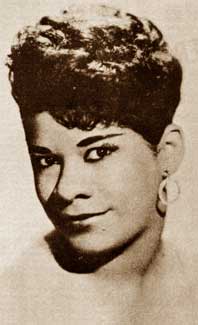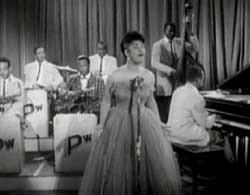 With Paul Williams' sextet behind her, & Paul the only musician in checked jacket rather than white, Ruth Brown stands out front in a flouncy dress peforming in the telescription from Studio Films, Inc.,Oh, What a Dream (1954).
With Paul Williams' sextet behind her, & Paul the only musician in checked jacket rather than white, Ruth Brown stands out front in a flouncy dress peforming in the telescription from Studio Films, Inc.,Oh, What a Dream (1954).
The song was written by her friend Chuck Willis, & was a hit single that year on the R&B charts.
On the record she's backed by the so-called "Rhythmakers" who in most cases would've been The Cues doing their usual studio work for Atlantic, but in this case it's actually the Drifters. The Studio Telescription recorded live is a very different version.
Ruth's vocal charisma is matched her charismatic physical presence. In a sexy low voice she begins to sing "Woke up this morning & I looked around/ So disappointed I laid back down/ Ohhh what a dream, what a dream i had last night."
It's a blues torch song with a gospel tint, adding up to a big dose of that R & B balladeering: "Dreamed I held you in my arms/ But I'm still waiting for that day to come/ Ohh what a dream, what a dream I had last night.
"Dreamed we were walkin' down the aisle/ The organ was playing here comes the bride/ You looked down at me & you began to smile/ But when I looked around, everybody began to cry.
"I opened my eyes, you weren't there/ All of my happiness just disappeared/ Ohhhh what a dream, what a dream I had last night."
An alto sax solo adds to the soulfulness of this wonderful performance. Ruth Brown is a tremendously fine singer with antic expressions & broad dramatic look of sadness. The way she wrings tears out of a lyric & a look could easily have become high camp, but maybe verging on camp but she sells it as authentic.
This telescription was incorporated into the halfhour episode Showtime at the Apollo: Rhythm in Harlem (1955). These shows were stitched together from telescriptions mostly filmed in 1951 & 1954, with "connecting" scenes from Apollo host William Bryant who is pretending the bands are present as he introduces them. Many viewers to this day wrongly assume these fudged "concerts" really were at the Apollo Theater.
Other short films incorporated in the Rhythm in Harlem set included Studio telescriptions for dancer Bill Bailey, vocal group the Clovers, & the great Dinah Washington, & earlier Snader telescriptions for Herb Jeffries & Lionel Hampton.
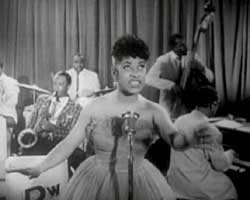 Ruth Brown's telescriptions for Studio Films, Inc., were all filmed on a live stage in Manhattan, used a year later in sundry episodes of the television series Showtime at the Apollo so-named despite having had nothing to do with the Apollo Theater.
Ruth Brown's telescriptions for Studio Films, Inc., were all filmed on a live stage in Manhattan, used a year later in sundry episodes of the television series Showtime at the Apollo so-named despite having had nothing to do with the Apollo Theater.
Raining Teardrops from My Eyes (1954) is a very interpretable number covered by vocal artists of more than one genre.
As performed here it comes very, very close to rock & roll, with a rockin' sax keeping a strong beat from Paul Williams' band in the background, & Ruth Brown just amping up the R & B power to rock 'n' roll levels.
This Rudolph Toombs composition had been a hit for Ruth on Atlantic, reaching number eleven on the R&B charts in 1951. The telescription is a unique arrangement, however. She's backed by the Budd Johnson Orchestra on the record, by the Paul Williams Sextet in the film.
With performers like Ruth Brown, Amos Milburn, & Big Joe Turner in the Showtime at the Apollo television series, & considering the penetration across America that television had by 1954, the veritable explosion of youth-demand for rock music shortly after the airing of the thirteen programs can't be a coincidence.
Ruth sings: "I remember the night you told me/ Our love would always be/ I wouldn't be blue & lonely/ Well, if you'd come back to me.
"Every single cloud would disappear/ I'd wear a smile if you were here/ So baby won't you hurry, cause I miss you so/ And it's rainin' teardrops from my eyes."
At an instrumental break is a superb alto sax solo, then Ruth finishes up with a big last note. This telescription was incorporated into Showtime at the Apollo: Stars Over Harlem (1955).
The halfhour episode also included 1954 Studio telescriptions starring tapper Little Buck & early rocker Big Joe Turner, & 1950-51 Snader telescriptions of Count Basie, Martha Davis, the King Cole Trio, & the Delta Rhythm Boys.
By splicing between performances host Willie Bryant & comics Mantan Moreland & Nipsey Russell, the program is made to look like a single night of variety instead of a cobbling of older short-short films.
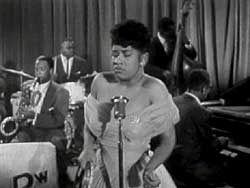 For another rockin' number Mama He Treats Your Daughter Mean (1954), Ruth has gotten herself a tambourine. Still out in front of the Paul William Sextet as in all her Studio telescriptions, she wacks that tambourine, strikes a fiesty pose, then sings:
For another rockin' number Mama He Treats Your Daughter Mean (1954), Ruth has gotten herself a tambourine. Still out in front of the Paul William Sextet as in all her Studio telescriptions, she wacks that tambourine, strikes a fiesty pose, then sings:
"Hey mama, he treats our daughter mean/ Hey mama, he treats your daughter mean/ Hey mama, he treats your daughter mean/ He's the meanest man I've ever seen.
"Mama he treats me badly/ Makes me love him madly/ Mama he takes my money/ Makes me call him honey/ Mama he can't be trusted/ Makes me so disgusted/ All of my friends say they don't understand/ What's the matter with this maaaaaan!/ Oh mama, he treats your daughter mean..."
The instrumentation is wailing hot, matching the energy of Ruth's vocal. Her Atlantic record version is quite different, & was her one cross-over hit reaching number 23 on the pop charts, but at the very top of the R&B chart.
This telescription got sewn into Showtime at the Apollo: Basin Street Revue (1955) sharing the half-hour program with 1951 Snaders by Cab Calloway & Herb Jeffries, & Studio telescriptions of Amos Milburne, Faye Adams, Sarah Vaughn, & the Clovers.
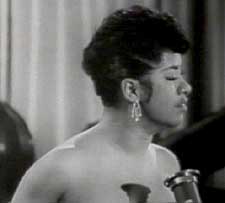 In case anyone feared Ruth Brown could only belt out a big-voiced jump tune, she calms down & proves otherwise for Have a Good Time (1954). In case anyone feared Ruth Brown could only belt out a big-voiced jump tune, she calms down & proves otherwise for Have a Good Time (1954).
This is a bluesy swing just a tad reminiscent of Billie Holiday, her first hero.
Indeed, when she started out, she was pretty much a Billie impersonator, until one night when the great woman turned up in the audience & was not pleased to see her every vocal inflection & even her body language copied.
Billie gave Ruth an angry dressing-down, but when calm enough to appreciate the talent it took, she counseled Ruth to sing as herself, & the imitation was dropped, though hardly the influence.
Ruth sings: "Goodbye. I hate to see you go/ But have a good time/ So long, I'll miss you dear I know/ But have a good time/ Have your fling, be gay with your new love/ I'm setting you free/ Dnce & sing, pretend that it's true love/ Don't worry about me...."
There'll again be a great alto sax solo, & Ruth's torchy close. The work of the Paul Williams sextet in so many of the 1954 telescriptions deserves special notice. The arrangements aren't highly varied because there was no time; in some cases performers showed up, & the Studio Films houseband just had to go with the flow to get the work done. That it never sounds haphazard or unpracticed is a testimony to the sextet's excellence.
Have a Good Time was incorporated in Showtime at the Apollo: Variety Time (1955). This episode also included Snaders of Cab Calloway & Lionell Hampton, & Studios of Big Joe Turner, Bill Bailey, & Sarah Vaughn.
Ruth's four Studio telescriptions can be found on the rather misnomered multi-artist compilation dvd Swing Era: Dinah Washington (2006). They may also be accessible at youtube as well.
The joyful chance of seeing Ruth in her prime has got to be appreciated. The four numbers she did for Studio Films, Inc., were all R & B hits for her, & she sold so well in the '50s that Atlantic Records came to be known as "the house that Ruth built."
But with the dominance in the 1960s of bubble-gummy rock, commerce-minded record companies thoght nothing of cutting formerly top artists loose. Although she recorded with a number of labels after Atlantic's cavalier dismissal, she was no longer a chart-topper & she was not making money.
With horrid irony she would be working as a maid for some while just to make ends meet. Atlantic Records having robbed her of years of royalties even claimed she owed them thirty-thousand dollars for travel & promotional expenses deducted from royalties by cheating accountants.
Fortunately she experienced a revival in the 1970s, & would remain on top with a National Public Radio show, a Tony Award for her musical review Black & Blue, appearances in the stage musicals Staggerlee & Hairspray (in which she played Motormouth Maybelle). In 1993, she was inducted into the Rock 'n' Roll Hall of Fame.
She also spearheaded a successful campaign to get Atlantic Records to pay her & a great many other artists the royalties they'd been cheated out of for decades, which in some cases put money in the pockets of destitute artists in retirement homes.
copyright © by Paghat the Ratgirl
|
